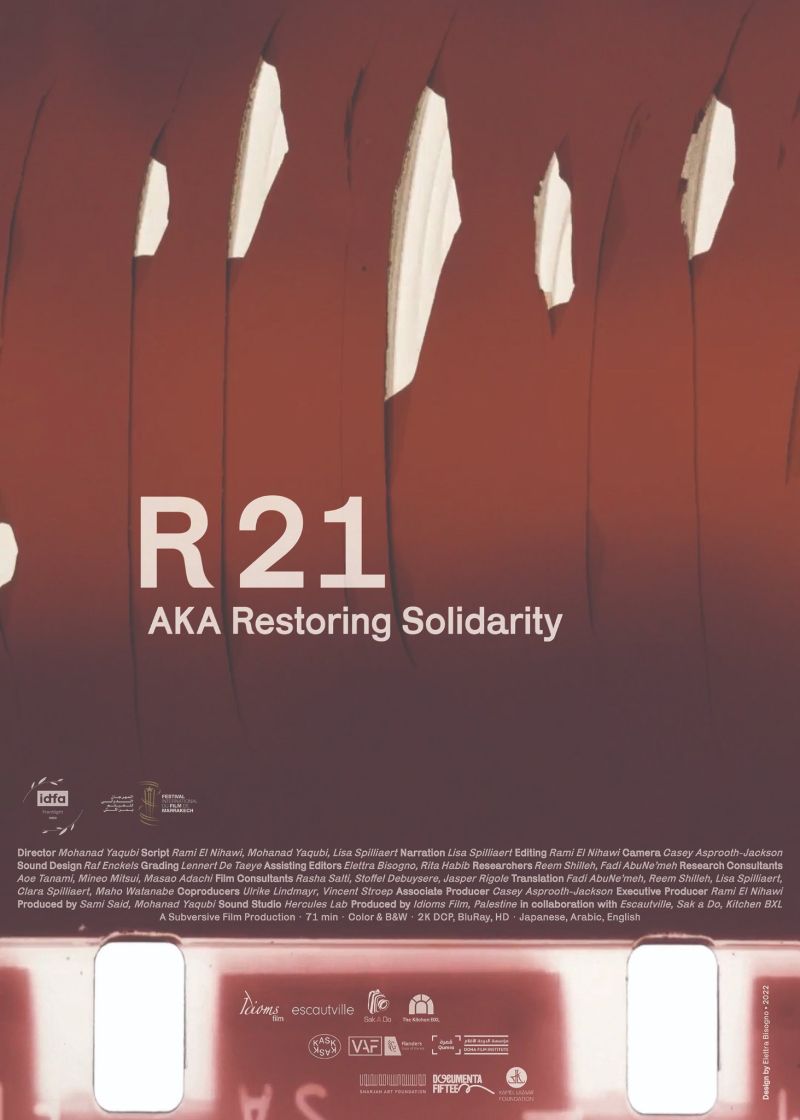
In the back of a Palestine solidarity group’s offices in Japan, the filmmaker finds a bunch of old film reels in canisters, and takes them to be digitised and preserved. This film is what he found.
So, before we get into the content of the films, I wanna talk about the structure of the movie overall. This film is an attempt to give the audience the same experience the filmmaker had. This is basically just a series of shorts played one after another. R21 may be a feature-length documentary, but watching it just feels like sitting down for an evening of short films. The filmmaker keeps his presence to a minimum, showing a prologue of the discovery of the film reels, and between shorts a few seconds showing the computer screen where the film is being uploaded into digitising software. That’s it. The rest of the film just plays the shorts back to back, and there is no narration giving historical context for each. Neither are the films placed in chronological order, you watch them in the order the filmmaker discovers them.
I get that this is to give you an unmediated experience with the content in the same manner that the filmmaker had. That’s the direction he chose to go in. Personally I felt like I would have benefitted from more than just feeling like I was watching over the director’s shoulder while he went through these films. I would have preferred some critical input. Just something, like putting them in chronological order, like giving a bit of explanation about the major events in the Occupation of Palestine in the 1970s and 80s. To some extent, I think the filmmaker presumes that if you’re coming to see a movie about Palestine, you would either have a thorough knowledge of its history, or you are coming to it fresh to see and be shocked by the injustices without needing to be bombarded with dates and timelines. Again, personal preference, I would just like a brief context of what is happening when so I can understand what I’m watching, especially when the films themselves are out of order, jumping from 1982 to 1964 to 1976. Like, the situation on the ground is very different in each of those years, those elapsing decades matter.
Secondly, the films themselves are made by a left-wing solidarity group formed in Japan, who oppose American military occupation of Japanese land, and Japanese government support for American imperial adventures through capitalist economic and military means. Their solidarity with Palestine is based on a sense of their shared identity as people whose land is occupied by capitalist imperial state powers, and whose resistance has been met with repression. This is reflected in their language and outlook in the films, which are very much of the times in the 60s, 70s and 80s during the Cold War.
These films were all created with a purpose. While some give more space to letting victims of the Occupation speak for themselves, some are fictional dramas acting as a call to arms for the Palestinian people and create an impassioned audience to volunteer their support to the cause. There is a range of varying subjectivity across the films, and many have explicit voiceovers commanding the viewer what to feel. Seen half a century, their type of propaganda seems obvious and wildly unsubtle.
Which again, is fine, but it is presented without comment. And when I lament a lack of critical input, I don’t mean being set against an opposing viewpoint, I mean being given context so language which was used in a specific left-wing political subculture in the 70s is less jarring and more accessible to the audience that will view it in 2024.
It’s a choice. The filmmaker preferred one thing, and I preferred another. Both are valid. Any context or commentary about the short would only be adding our own viewpoints, biases, and type of propaganda over the top of that of the past. Not having that allows these films to speak for themselves.
So what about the films? There’s a range of them. As I say, one is a little drama showing children being shot and killed by the Israeli military, and their friends becoming determined to grow up and fight for the liberation of their people. Most are documentaries, interviewing Yasser Arafat about the importance of Japanese solidarity, showing demonstrations against Occupation, showing the desperate conditions people are living in in the refugee camps.
My favourite was the film Kuneitra: Death of a City, which is an interview with an elderly Christian woman whose entire town has been razed by the Israelis. She describes what her town was like before, and how the Israelis massacred the people, forcing any survivors to flee for their life, then flattened the whole town. Every building, every home, levelled to rubble. The films shows the locations she’s talking about, shows the damage. They destroyed the church, they destroyed the mosque, they shelled the minaret tower. They even desecrated the graves, so there would be no reason for anyone to ever come back. When this elderly woman is asked what she thinks should be done with the remains of Kuneitra, she says to leave it as it is. She asks what better monument could there be? “It doesn’t need anyone to explain”. As the camera pans over the utter devastation that used to be home to 20,000 people, the scene speaks for itself.
R21 AKA Restoring Solidarity is a film that manages to be interesting but not massively informative. It is great to see these little snapshots of the history of the Palestinian struggle against the Occupation, but all it does is make me wish I knew more.